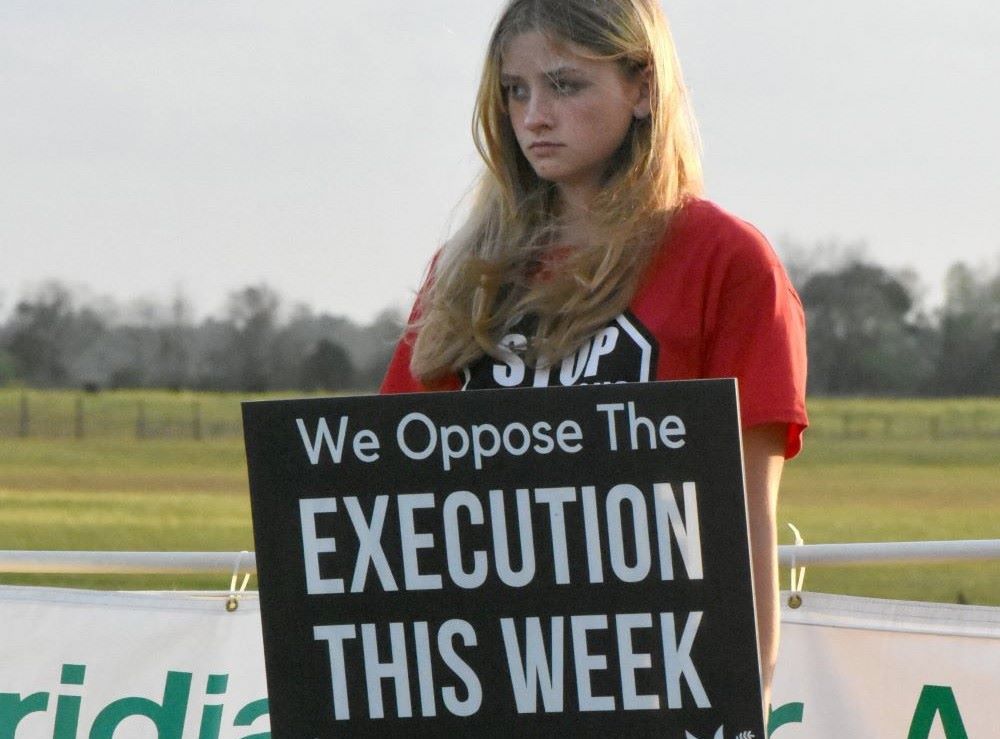
A student from Lourdes Academy Catholic School in Daytona Beach, Fla., protests the death penalty at the Florida State Prison Feb. 23, 2023. Some 200 death row prisoners have been exonerated. (OSV News/Florida Catholic/Glenda Meekins)
Editor's note: Today, Oct. 10, is the 22nd World Day Against the Death Penalty. According to the World Coalition Against the Death Penalty, the day is "dedicated to challenging the misconception that the death penalty can make people and communities safer."
This summer, the 200th prisoner was exonerated from death row. This shocking milestone teaches us that wherever the death penalty exists, innocent people are at risk of being wrongfully executed. In 2021, the Death Penalty Information Center dubbed this national reality an "innocence epidemic."
In the United States today, 35 of the 50 U.S. states, plus the District of Columbia, have either abolished the death penalty or not carried out an execution for at least 10 years. But even as the use of the death penalty declines, exonerations continue to pile up and the serious risk of taking an innocent life persists. These facts alone should prove the death penalty is irretrievably broken. But the system is also ineffective and costly and is too often unevenly applied to Black and brown people, as well as those with severe mental illnesses, intellectual disabilities and brain injuries.
The Catholic Church believes the death penalty violates the sanctity of life, and that every human being is created in the image of God, giving them inherent dignity. According to the church, that dignity is never lost, even if someone commits a serious crime. Research also shows that nearly 80% of Catholics are open to supporting legislation to abolish the death penalty, believing that today's world offers many ways to address crime and violence without resorting to more killing.
Even as the use of the death penalty declines, exonerations continue to pile up and the serious risk of taking an innocent life persists.
Evidence shows the death penalty is no more effective than imprisonment in deterring murder and that it may even be an incitement to criminal violence. Death-penalty states don't have lower rates of criminal homicide than non-death-penalty states. Further, most death penalty trials are found to be significantly flawed, which leads to 68% of death sentences being overturned.
The cases of the two recent exonerations that brought the number to 200 involved issues in which the prosecution withheld evidence favorable to the defense. Sadly, these two cases are far from unique and reflect a persistent pattern in innocence cases.
Official misconduct and perjury/false accusation are the two leading causes of wrongful convictions that land people on death row. Official misconduct was present in 142 exonerations (71.% of cases) and perjury/false accusation was present in 137 exonerations (68.5% of cases). More than half the cases involved both misconduct and perjury (111, or 55.5%), and one or the other or both were factors in 84.0% of the cases (168). These numbers include only the wrongful capital convictions that have been overturned and have then led to exonerations. Many capital convictions have not been overturned because of procedural barriers to appeals. In addition, some of those on death row have pled guilty to lesser crimes they didn't commit in order to obtain their freedom.
Pope Francis declared the world should work to abolish the death penalty in the upcoming Jubilee Year of 2025, which is themed "Pilgrims of Hope." He called on all Catholics — especially bishops — to "be one in demanding dignified conditions for those in prison, respect for their human rights and above all the abolition of the death penalty, a provision at odds with Christian faith and one that eliminates all hope of forgiveness and rehabilitation."
Advertisement
The risk of taking an innocent life should negate the use of capital punishment. The recent execution of Marcellus Williams in Missouri, despite the mishandling of important DNA evidence by the state and calls to overturn the conviction by the original prosecutor, exemplifies that risk. Why do we roll the dice in an imperfect system when the punishment, once carried out, cannot be appealed or reversed and completely eliminates any possibility of penance and atonement?
While 200 innocent lives have been spared, the milestone highlights the fact that the judicial system made 200 mistakes. There are simply too many ways a death penalty case can go awry, and even when the flaws are glaring, courts are often loath to redress them. The only way to ensure that this country doesn't execute any more innocent people is to end the death penalty once and for all.
By doing so, we can keep society safe while honoring the humanity of every person and advancing forms of justice that enable healing and redemption.





